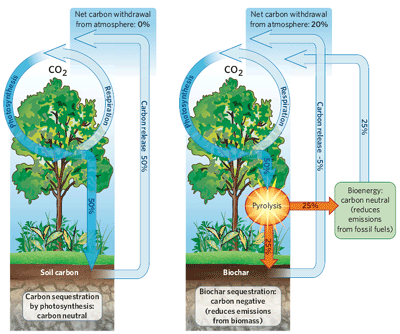Introduction
There is a large imbalance between carbon release to the atmosphere and carbon uptake by other compartments that leads to a continued increase in atmospheric CO2. Bio char was of great importance in increasing soil carbon storage, improving soil fertility, as well as maintaining the balance of soil ecosystems, and it could act as a kind of soil fertilizer or amendment to increase crop yield and plant growth by supplying and retaining nutrients.
Bio char is the carbon-rich product obtained when biomass, such as wood, manure or leaves, is heated in a closed container with little or no available air pyrolysis. In more technical terms, biochar is produced by so-called thermal decomposition of organic material under limited supply of oxygen (O2), and at relatively low temperatures (<700°C).
When plant tissues are used as raw materials for bio char production, heat produced during combustion volatilizes a significant portion of the hydrogen and oxygen, along with some of the carbon contained within the plant’s tissues. The remaining carbonaceous materials contain many poly-aromatic (cyclic) hydrocarbons, some of which may contain functional groups with oxygen or hydrogen.
The pyrolysis process greatly affects the qualities of bio char and its potential value to agriculture in terms of agronomic performance or in carbon sequestration.
Because of its macromolecular structure dominated by aromatic C, bio char is more recalcitrant to microbial decomposition than uncharred organic matter.
Bio char is believed to have long mean residence times in soil, ranging from 1,000 to 10,000 years. ‘Bio char’ is the appropriate term where charred organic matter is applied to soil in a deliberate manner, with the intent to improve soil properties.
This distinguishes biochar from charcoal that is used as fuel for heat, as a filter, as a reductant in iron-making or as a colouring agent in industry.
Functions of Biochar in soil
- Increases soil carbon storage
- Reduces leaching of N into ground water
- Reduces emissions of green house gases (GHGs)
- Increases cation exchange capacity (CEC)
- Moderating soil acidity
- Increases water retention
- Increases number of beneficial soil microbes
- Contaminant immobilization
- Increases biological nitrogen fixation
- Inhibiting nitrification
1. Biochar sequestration enhances non-biodegradable soil carbon pool
Bio char have two-fold higher carbon content than ordinary biomass. Moreover, biochar locks up rapidly decomposing carbon in plant biomass in a much more durable form. Once biochar is incorporated into soil, it is difficult to imagine any change in practice that would cause a sudden loss of stored carbon.
[indeed-social-locker sm_list=’fb,tw,go1′ sm_template=’ism_template_1′ sm_list_align=’horizontal’ sm_display_counts=’false’ sm_display_full_name=’true’ locker_template=2 sm_d_text='<h2>This premium content is locked</h2><p>Share This Page To Unlock The Content!</p>’ ism_overlock=’default’ ]
Plant biomass decomposes in a relatively short period of time, whereas biochar is orders of more stable magnitudes. It is investigated the behaviour of biochars in arable and forest soil in a greenhouse experiment in order to prove that these amendments can increase carbon storage in soils.

Fig. 1 Biochar sequestration- A carbon negative technology (Source: Lehmann, 2007)
2. Biochar amendments affect soil N status
Bio char can play a key role in nutrient cycling, potentially affecting nitrogen retention when applied to soils. Laboratory experiments showed that biochar could adsorb ammonium ion predominantly by cation exchange. Ammonium nitrogen (NH4+-N) concentrations in the leachate of the soil columns showed significant differences at different depths after ammonium chloride application to the columns. Addition of 0.5% biochar to the surface soil layer retarded the downward transport of NH4+-N in the 70-day experiment. It was examined that the potential, magnitude, and causes of enhanced biological N2-fixation (BNF) by common beans (Phaseolus vulgaris L.) through biochar additions. Biomass production of N-fixing beans was significantly higher than that of non-nitrogen fixing beans at all levels of biochar additions. The reduced availability of N and increased availability of other nutrients helped in fixation of atmospheric N due to biochar addition. Experimental data showed the ethylene production from biochar and biochar-amended soils. The production of ethylene from biochar-amended soils which caused a decrease in the available nitrate and increase in the available ammonium at the end of the 30 day incubation. The more important implication of this finding is the potential utilization of biochar as a nitrification inhibitor.
3. Biochar reduces green house gas production from soil
A potential abatement to increasing levels of carbon dioxide (CO2) in the atmosphere is the use of pyrolysis to convert vegetative biomass into a more stable form of carbon (biochar) that could then be applied to the soil. It was found that biochar amendments reduced CO2 production. In addition, biochar additions suppressed N2O production. Biochar stabilizes soil organic carbon by reducing the mineralization rate.
4. Biochar affects physico-chemical properties of soil
Bio char, a co-product of thermochemical conversion of lignocellulosic materials into advanced biofuels, may be used as a soil amendment to enhance the sustainability of biomass harvesting. The amount of water retained by soil in the columns at gravity drained equilibrium was greater for the biochar treatments than the water retained by the biochar control columns. This result shows the ability of biochar to increase the moisture retention capacity of soils and has the potential to increase crop yields for crops exposed to water stress during critical periods of the growing season. The biochar treated columns had significantly lower bulk densities than the non-biochar controls. The results confirm that biochar is an effective soil conditioner. Specific surface area is an indirect measure of the capacity of soils to retain water, nutrients, and various contaminants. The specific surface area increased from 130 to 153 m2 g−1 as the biochar concentration increased from 0 to 20 g kg−1.
The physical properties of acid sulphate soil improve due to application of rice husk biochar. Rice husk biochar could be used as a substitution for liming materials to increase the pH of acidic soils. The soils applied with biochar have shown the highest CEC. The decrease in exchangeable Al and soluble Fe in rice husk biochar and other organic soil amendments is undoubtedly due to the increase of CEC in the soil.
5. Biochar effects on soil microbial population
Bio char affects microbial populations and soil biogeochemistry. Both biochar and mycorrhizal associations, ubiquitous symbioses in terrestrial ecosystems, are potentially important in various ecosystem services provided by soils, contributing to sustainable plant production, ecosystem restoration, and soil carbon sequestration and hence mitigation of global climate change. After reviewing the experimental evidence for such biochar effects on mycorrhizal associations, yeast-derived biochar strongly increased the proportion of fungi in both arable and forest soils, which consequently turned out as the microbial group that mostly utilized this type of biochar. Glucose-derived biochar was used as carbon source for the build up of bacterial biomass mainly utilized by the gram-negative bacteria.
6. Biochar enhances soil
Biochar application in Tsunami-affected paddy fields in Sri Lanka on the yield and yield attributes of rice crop, and the experimental results showed that the application of 2 t rice-husk-biochar ha-1 increased the grain yield from less than 4 t ha-1 for the control treatment to more than 5 t ha-1 for the biochar treatment.
Limitations for bio char technology adoption
– Pyrolysis does have costs associated with the machinery and heating.
– Dependent on supply of cheap biomass.
– Total cost of biochar production is very high for each ton of feedstock.
Conclusion
– Biochar addition to the soil improves soil fertility by improving the soil carbon storage, reducing the loss of N through percolating water, fixing atmospheric N through BNF.
– The fertilizer function of biochar is highly supported by an increased water retention and CEC of the soils caused by the huge surface area of the biochar.
– Biochar amendment could bring additional photosynthetically fixed carbon into the soil, where it could contribute to longer term carbon storage and thus mitigates increasing atmospheric CO2 concentrations.
– Production of ethylene from biochar amended soils is an important finding and here lies the potential utilization of biochar as a nitrification inhibitor.
– Addition of biochar to the soil is equally helpful from contaminant immobilization point of view.
– Application of rice-husk-charcoal could be an option for better harvest of rice crop in the Tsunami affected paddy fields of coastal regions.
– Rice husk biochar could be used as a substitute for liming materials to improve the quality of acid sulphate soils.
– Because of its higher cost of production, bio char technology has not been popularized in the developing nations.
Contributed By:
Dr S. K. Singhal*, Dr V. K. Sharma* and Dr R. N. Pandey**
*Sr. Scientist, ** Principal Scientist
Division of Soil Science and Agricultural Chemistry, IARI, Pusa, New Delhi -110 012
[/indeed-social-locker]








